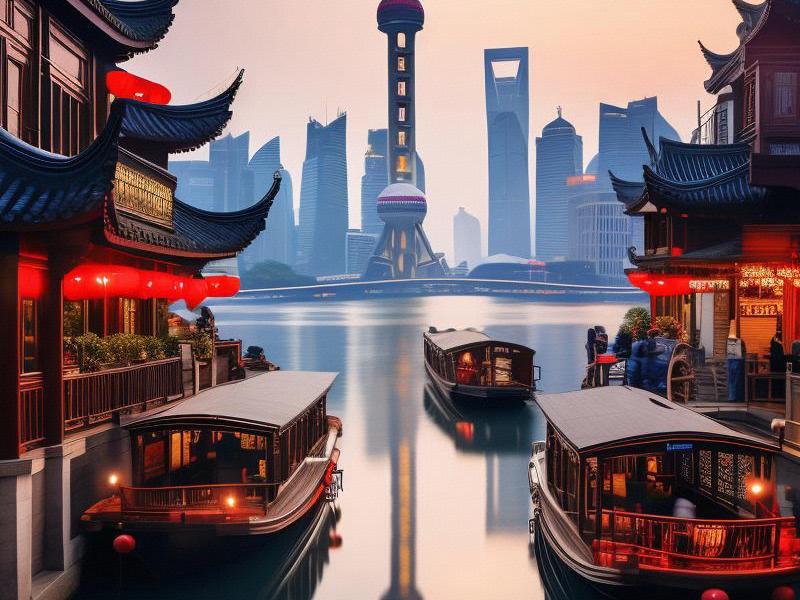This article delves into the multifaceted aspects of Shanghai, exploring its transformation from a small fishing village to a global metropolis. It highlights the city's economic prowess, architectural marvels, cultural vibrancy, and its role as a bridge between China and the world.

Shanghai, the largest city in China, is a vibrant metropolis that has undergone a remarkable transformation over the past century. Situated on the banks of the Huangpu River, Shanghai is not only a major economic hub but also a cultural melting pot, blending traditional Chinese elements with modern international influences.
The city's history dates back to the 11th century when it was a small fishing village. However, it was during the 19th century that Shanghai began to emerge as a significant urban center. The opening of the Treaty Ports in 1842 following the First Opium War marked the beginning of Shanghai's transformation into a global city. Foreign powers established concessions in the city, bringing with them architectural styles, technologies, and cultural practices that would shape Shanghai's unique identity.
One of the most iconic symbols of Shanghai is the Bund, a waterfront area that showcases a blend of colonial-era architecture and modern skyscrapers. The Bund's historic buildings, such as the Peace Hotel and the Customs House, stand as a testament to the city's rich history and its role as a gateway to China. Today, the Bund is a popular tourist destination, offering stunning views of the Pudong skyline across the Huangpu River.
Pudong, on the other side of the Huangpu River, is a symbol of Shanghai's rapid economic development. Once a rural area, Pudong has been transformed into a modern financial district, home to some of the world's tallest buildings, including the iconic Oriental Pearl Tower, the Jin Mao Tower, and the Shanghai Tower. These skyscrapers represent Shanghai's status as a global financial hub and a leader in urban planning and architecture.
夜上海419论坛
Shanghai's economy is diverse and robust, driven by industries such as finance, trade, manufacturing, and technology. The city is home to the Shanghai Stock Exchange, one of the largest stock exchanges in the world, and the Pudong International Airport, which serves as a major gateway for international flights. Shanghai's port, the Port of Shanghai, is the busiest container port in the world, handling millions of containers annually.
In addition to its economic achievements, Shanghai is also known for its cultural vibrancy. The city boasts a rich cultural scene, with numerous museums, theaters, galleries, and music venues. The Shanghai Museum, located in People's Square, is renowned for its extensive collection of Chinese art, including ancient ceramics, calligraphy, and paintings. The city's theaters, such as the Shanghai Grand Theatre and the National Centre for the Performing Arts, host a wide range of performances, from traditional Chinese opera to contemporary ballet and theater productions.
Shanghai's culinary scene is another aspect of its cultural richness. The city is a paradise for food lovers, offering a wide variety of cuisines, from traditional Shanghainese dishes to international flavors. Dishes such as xiaolongbao (soup dumplings), shengjianbao (pan-fried buns), and hongshao rou (red-braised pork) are must-tries for visitors. Shanghai's night markets and bustling food streets provide an authentic taste of the city's culinary culture.
上海龙凤419自荐
The city's commitment to sustainability and green development is also noteworthy. Shanghai has implemented various initiatives to reduce pollution, promote renewable energy, and improve public transportation. The city's extensive metro system, one of the largest in the world, provides efficient and environmentally friendly travel options for residents and visitors alike.
Shanghai's role as a global city extends beyond its economic and cultural achievements. The city has been a host to numerous international events, including the World Expo in 2010, which attracted millions of visitors from around the world. The Expo showcased Shanghai's ability to organize large-scale events and highlighted the city's commitment to innovation and sustainable development.
The city's international influence is also evident in its education and research institutions. Shanghai is home to prestigious universities such as Fudan University and Tongji University, which attract students and scholars from around the world. The city's research institutions and innovation hubs contribute to advancements in science, technology, and medicine, further solidifying Shanghai's position as a global leader.
上海私人品茶
However, Shanghai's rapid development has not been without challenges. The city faces issues such as population density, housing shortages, and environmental concerns. The government has implemented various policies to address these challenges, including urban planning initiatives, affordable housing programs, and environmental conservation efforts.
Despite these challenges, Shanghai continues to thrive as a dynamic and resilient city. Its ability to adapt to changing circumstances and maintain its position as a global metropolis is a testament to the city's resilience and innovation. Shanghai's story is one of transformation, blending tradition with modernity, and serving as a model for urban development worldwide.
In conclusion, Shanghai is a city that embodies the spirit of China's rapid modernization and globalization. Its rich history, economic prowess, cultural vibrancy, and commitment to sustainability make it a unique and influential metropolis. As Shanghai continues to evolve, it remains a beacon of progress and a bridge between China and the world, inspiring future generations with its story of success and resilience.